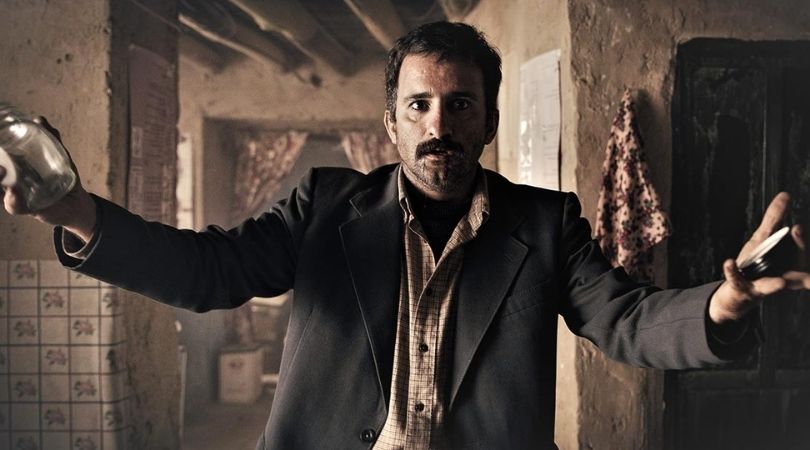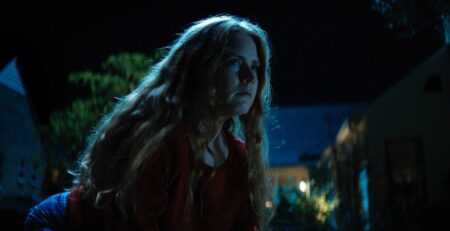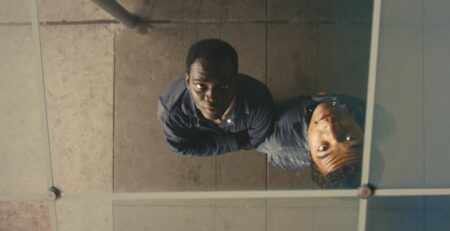
Zalava is not your average exorcism film. Director Arsalan Amiri plays with your beliefs and perceptions to craft a metaphysical narrative that delves into the role of tradition in a community. More thriller than horror, it might not be the best pick for your classic TIFF Madness Midnight experience, but it’s worth a watch due to its arsenal of psychological trickery.
The title of the film is the name of its setting: a mountainous Iranian village. Here, superstitions of demonic possessions run wild and villagers use all sorts of methods to fend for their lives: they use metal for protection, they shoot limbs off potential demons, and call in exorcists to get rid of the plague. This is noticed by skeptical sergeant Masoud (Navid Pourfaraj) who starts interfering in the local rituals by confiscating weapons and arresting Amardan (Pouria Rahimi Sam), the beloved shaman and exorcism expert.
While trying to keep people safe, Masoud accidentally awakens restlessness in the village and he himself starts to doubt his own beliefs. What if everything is real? What if Amardan is not a charlatan after all? That would mean his beloved Maliheh (Hoda Zeinolabedin), the local Zalavan doctor, might be in grave danger.
Have you ever considered an empty pickle jar to be sinister? Ridiculous, right? Well, those days are over because Zalava has changed the game. When Amardan claims to have captured a demon inside an empty jar, Masoud brushes the idea aside but confiscates it anyway. He’s hell-bent on sticking to his own beliefs and refuses to believe the existence of a demonic presence. However, just like the cute little kitty wanting to play with the jar at his office, Masoud becomes curious. Should he open it just to prove everyone wrong? The consequence of this struggle is a highly tense scene that plays with ideas of fears and superstitions. It’s a testament to the brilliance of the script how much tension it manages to extract out of a cat and a jar.
Amiri uses the jar to represent paranoia and its ease to spread. There are no visual effects or flashy sequences, just humans wanting to destroy each other after delving into mass hysteria. Yet, he doesn’t give in to straightforward answers or resolutions.
Zalava doesn’t judge the people for believing in demons, it merely explores how an irrational idea can evolve into an uncontrollable monster. The topic takes special priority in our modern reality where we see the most absurd conspiracy theories spreading like fire, making people fall into seemingly idiotic holes that can endanger them or the people around them.
Navid Pourfaraj is such a brilliant choice for this character. He walks around with an unconcerned look, barely batting an eye while everyone around freaks out at the possibility of a demonic presence. He’s cool but not entirely likable. His character isn’t exactly a hero. Masoud is intolerant and doesn’t attempt to understand the events around him or think about the possible consequences of messing with a town on the edge of mass hysteria.
The film does occasionally flounder due to uneven pace and overused horror tropes. And even though the climactic sequence is definitely memorable, it gambles too much with its length which ends up creating more frustration than tension.
Zalava is an unconventional symbolic tale that pits religious superstitions against rationality to reflect on how the imposition of ideas and beliefs can turn into a barrel of dynamite for vulnerable minds.
Zalava is screening in the Midnight Madness section of the 2021 Toronto International Film Festival.
Zalava
-
Rating - 7/107/10
TL;DR
Zalava is an unconventional symbolic tale that pits religious superstitions against rationality to reflect on how the imposition of ideas and beliefs can turn into a barrel of dynamite for vulnerable minds.




